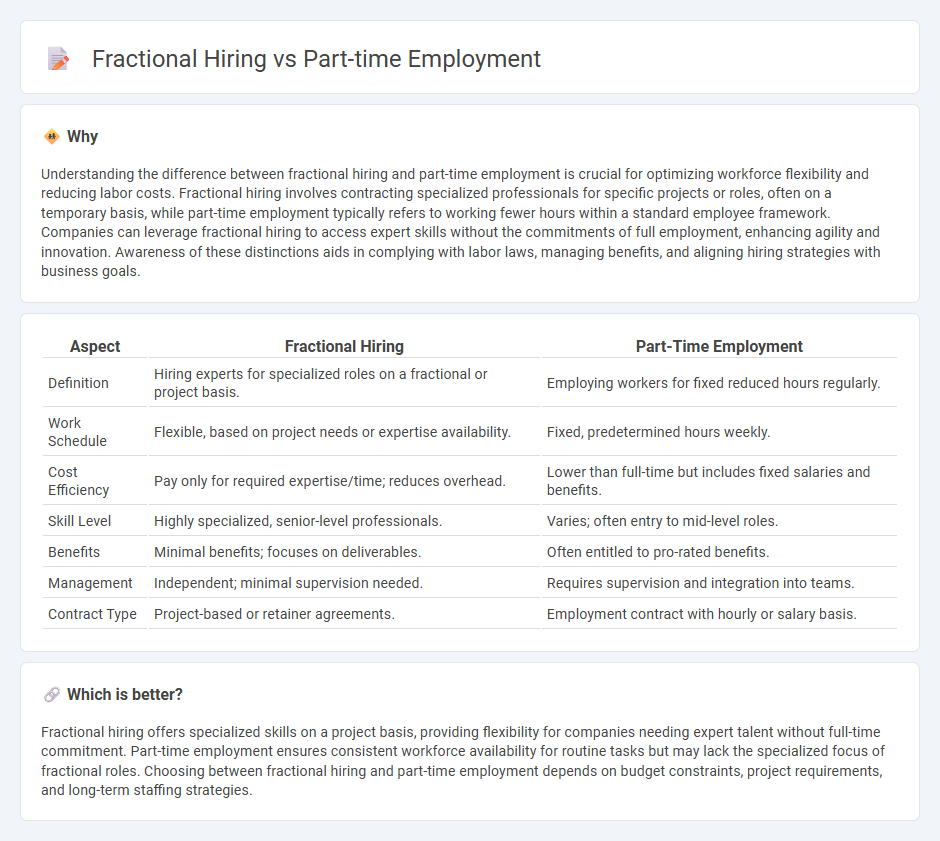
Fractional hiring involves contracting skilled professionals for specific projects or hours, offering businesses flexibility and access to expert talent without full-time commitments. Part-time employment typically entails a consistent, reduced work schedule with set hours and employee benefits, suitable for ongoing operational roles. Explore the key differences and benefits of fractional hiring versus part-time employment to optimize your workforce strategy.
Why it is important
Understanding the difference between fractional hiring and part-time employment is crucial for optimizing workforce flexibility and reducing labor costs. Fractional hiring involves contracting specialized professionals for specific projects or roles, often on a temporary basis, while part-time employment typically refers to working fewer hours within a standard employee framework. Companies can leverage fractional hiring to access expert skills without the commitments of full employment, enhancing agility and innovation. Awareness of these distinctions aids in complying with labor laws, managing benefits, and aligning hiring strategies with business goals.
Comparison Table
| Aspect | Fractional Hiring | Part-Time Employment |
|---|---|---|
| Definition | Hiring experts for specialized roles on a fractional or project basis. | Employing workers for fixed reduced hours regularly. |
| Work Schedule | Flexible, based on project needs or expertise availability. | Fixed, predetermined hours weekly. |
| Cost Efficiency | Pay only for required expertise/time; reduces overhead. | Lower than full-time but includes fixed salaries and benefits. |
| Skill Level | Highly specialized, senior-level professionals. | Varies; often entry to mid-level roles. |
| Benefits | Minimal benefits; focuses on deliverables. | Often entitled to pro-rated benefits. |
| Management | Independent; minimal supervision needed. | Requires supervision and integration into teams. |
| Contract Type | Project-based or retainer agreements. | Employment contract with hourly or salary basis. |
Which is better?
Fractional hiring offers specialized skills on a project basis, providing flexibility for companies needing expert talent without full-time commitment. Part-time employment ensures consistent workforce availability for routine tasks but may lack the specialized focus of fractional roles. Choosing between fractional hiring and part-time employment depends on budget constraints, project requirements, and long-term staffing strategies.
Connection
Fractional hiring and part-time employment both offer flexible workforce solutions that align with evolving business needs and employee preferences. Fractional hiring involves engaging professionals for specific expertise on a part-time or project basis, while part-time employment denotes reduced working hours compared to full-time roles. These models enhance organizational agility by enabling cost-effective access to talent without the commitment of full-time contracts.
Key Terms
Work Hours
Part-time employment typically involves working fewer hours than a full-time schedule, often set weekly, such as 20 to 30 hours, whereas fractional hiring allocates specific hours or project-based tasks tailored precisely to business needs, often spread across multiple clients. Part-time roles are more consistent and predictable in work hours, while fractional roles offer greater flexibility and specialization, enabling businesses to access expert skills without a full-time commitment. Explore further to understand how tailoring work hours can maximize efficiency through part-time employment or fractional hiring models.
Employment Contract
Part-time employment involves a contract where the employee works fewer hours than full-time staff, often with standardized benefits and fixed schedules. Fractional hiring contracts cater to specialized professionals offering expertise on a project or task basis, emphasizing flexibility and outcome-oriented deliverables rather than fixed hours. Explore the distinctions in employment contracts to optimize your workforce strategy effectively.
Job Flexibility
Part-time employment typically involves working a set number of hours per week with a consistent schedule, offering limited job flexibility. Fractional hiring allows businesses to engage specialists or executives for specific projects or periods, providing greater adaptability in roles and hours. Explore how fractional hiring can enhance job flexibility and meet evolving workforce needs.
Source and External Links
Understanding Part-Time Jobs: Definition, Benefits, and Opportunities - Part-time employment typically means working fewer than 30 hours per week, offering flexibility, work-life balance, and additional income but often with limited benefits and career advancement opportunities.
Part-Time vs Full-Time: How Many Hours & How to Classify? - In the US, part-time is usually defined as 1 to 34 hours per week, with pay often prorated and benefits for part-time workers generally more limited than for full-time employees.
part time jobs in laurel, md - Indeed - Part-time job opportunities in Laurel, MD span various industries including retail, food service, and delivery, offering flexible work schedules suitable for diverse needs.
 dowidth.com
dowidth.com